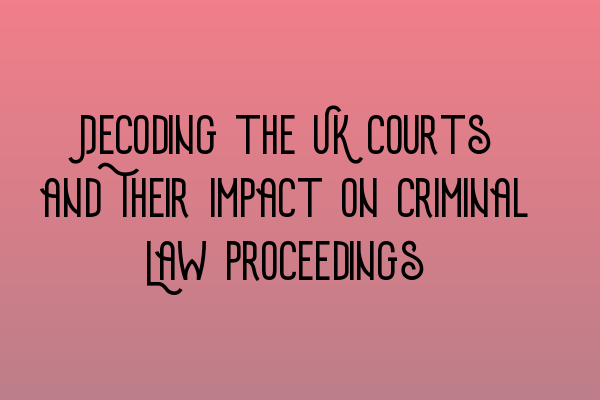Decoding the UK Courts and Their Impact on Criminal Law Proceedings
When it comes to criminal law proceedings in the UK, understanding the structure and functioning of the UK courts is essential. The court system plays a crucial role in ensuring justice is served, and as a legal practitioner, it’s important to be well-versed in these matters. In this comprehensive guide, we will walk you through the intricacies of the UK court system and its impact on criminal law proceedings.
The UK Court Hierarchy
The UK court system is structured in a hierarchical manner. At the top of the pyramid sits the Supreme Court, which is the highest court of appeal in the UK. The decisions made by the Supreme Court are binding on all other courts in the country. Beneath the Supreme Court, there are various levels of courts, each with its own jurisdiction and scope. These include the Court of Appeal, the Crown Court, and the Magistrates’ Court.
The Court of Appeal serves as the second-highest court in the UK, hearing appeals from lower courts. It is divided into two divisions: the Civil Division and the Criminal Division. The Criminal Division, in particular, handles appeals related to criminal law proceedings. Understanding the intricacies of the Court of Appeal is crucial for criminal law practitioners, as they may need to present appeals or respond to appeals on behalf of their clients.
One level below the Court of Appeal is the Crown Court. The Crown Court is responsible for handling serious criminal offenses, such as murder, rape, and robbery. It serves as a trial court and also hears appeals from the Magistrates’ Court. The proceedings in the Crown Court are generally more formal compared to those in the Magistrates’ Court.
The Magistrates’ Court is the lowest level of court in the UK court hierarchy. It deals with less serious criminal offenses, known as summary offenses, and acts as an initial court for most criminal cases. Magistrates, who are trained volunteers, preside over these courts. In some cases, the Magistrates’ Court may transfer more serious cases to the Crown Court for further hearing.
The Impact on Criminal Law Proceedings
The structure of the UK courts has a significant impact on criminal law proceedings. The decision of which court will handle a specific case depends on the seriousness of the offense and the jurisdiction of the courts involved.
For example, if an individual is charged with a summary offense, the case will likely be heard in the Magistrates’ Court. The defendant may choose to plead guilty or not guilty, and the magistrate will decide the appropriate course of action. In case of a guilty plea, the magistrate will pass a sentence. If the defendant pleads not guilty, the case may proceed to trial in the Magistrates’ Court, or it may be transferred to the Crown Court for a more formal trial.
In contrast, if a defendant is charged with a serious offense, such as murder or rape, their case will be heard in the Crown Court. The Crown Court has the authority to conduct a full trial with a judge and jury. The defense and prosecution teams present their arguments, and ultimately, the jury decides whether the defendant is guilty or not guilty. If the defendant is found guilty, the judge will pass an appropriate sentence.
Understanding the specific procedures and protocols of each court is vital for criminal law practitioners. It allows them to navigate the system effectively, present compelling arguments, and ensure their clients receive a fair trial.
Conclusion
The UK court system is a complex structure that influences the course of criminal law proceedings. From the Supreme Court to the Magistrates’ Court, each level serves a specific purpose and holds distinct jurisdiction. As a legal practitioner, gaining a deep understanding of the UK courts is crucial for providing effective representation to your clients.
If you are preparing for the SQE (Solicitors Qualifying Examination) and need resources to enhance your knowledge in criminal law, we recommend checking out our related articles:
- SQE 1 Practice Exam Questions
- SQE 1 Practice Mocks FLK1 FLK2
- SQE 2 Preparation Courses
- SQE 1 Preparation Courses
- SRA SQE Exam Dates
We hope you found this guide informative and it has deepened your understanding of the UK courts and their impact on criminal law proceedings. Should you have any further questions or require legal assistance, do not hesitate to contact SQE Criminal Law & Practice Law UK.
